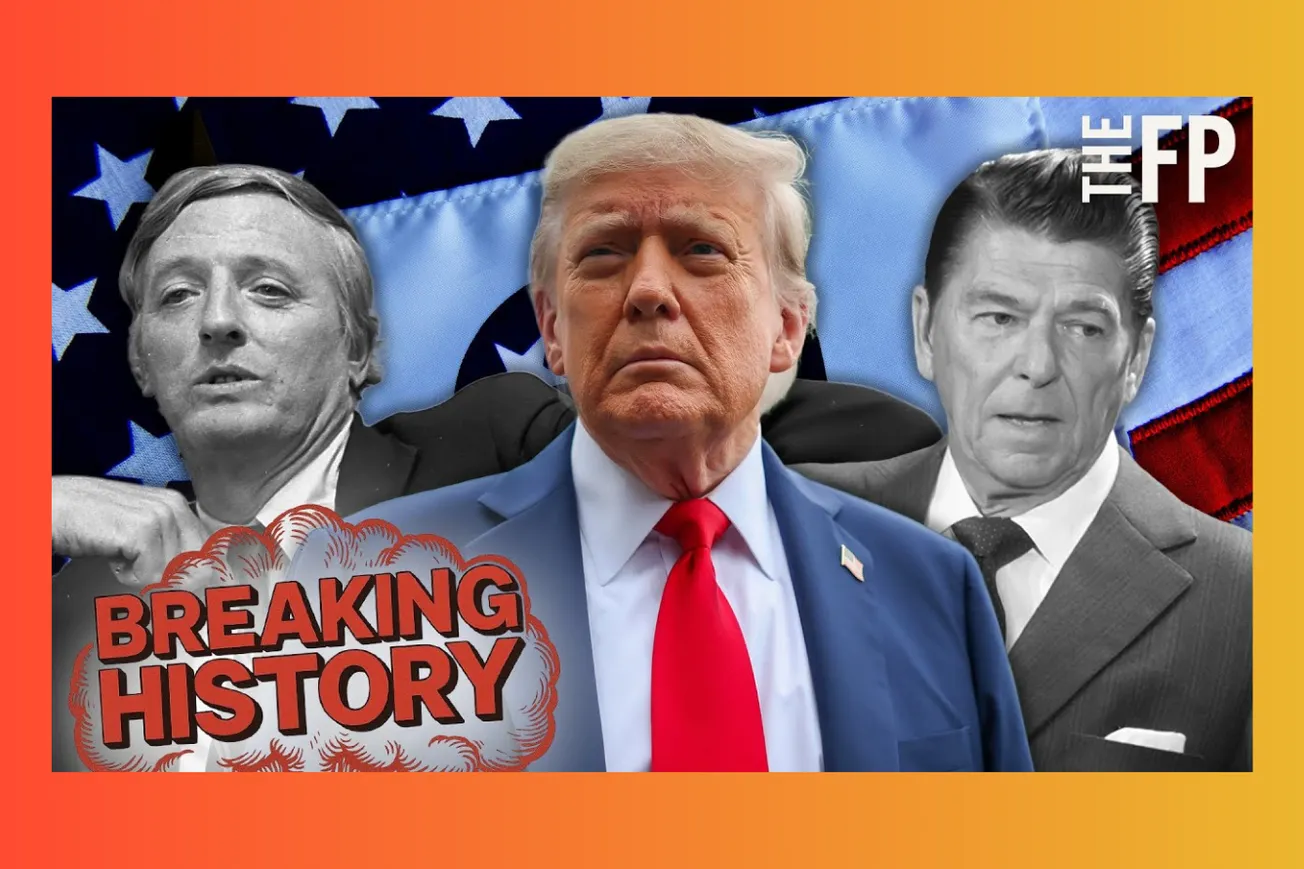Table of Contents
November 2025 marks the 100th anniversary of William F. Buckley Jr.'s birth, yet his vision of intellectual conservatism lies buried beneath Trump's populist revolution that demands loyalty over debate.
From National Review's founding motto to stand athwart history yelling stop, to Trump's federal interventions and spending promises—how America's conservative movement abandoned its philosophical moorings.
Key Takeaways
- William F. Buckley Jr. created American conservatism by uniting anti-communist foreign policy with limited government domestic principles through National Review magazine
- Reagan's 1980s revolution represented the apex of Buckley's intellectual conservatism before its gradual decline into partisan loyalty
- Trump's movement abandons core conservative principles including free trade, fiscal restraint, and limited federal intervention in state affairs
- Buckley's greatest legacy was his ability to "disagree agreeably"—publishing dissenting views and engaging opponents through respectful debate
- The modern conservative movement prioritizes Republican Party victory over conservative philosophical consistency, reversing Buckley's approach
- Trump demands total loyalty and cannot brook dissent, contrasting sharply with Buckley's delight in intellectual debate and conversation
- Current conservatives would "stand athwart Donald Trump yelling stop" if they maintained Buckley's definitional consistency on limited government
- The transformation reflects broader American political tribalism that has forgotten how to engage in civil disagreement across ideological divides
The Aristocratic Revolutionary: Buckley's Unlikely Origins
William F. Buckley Jr.'s conservative revolution emerged from elite privilege rather than populist resentment. Born into oil fortune wealth, educated at Yale, and tapped for Skull and Bones, Buckley represented everything modern populists claim to oppose.
Yet this aristocratic background enabled his intellectual project. Buckley's loneliness as the sixth of ten children, raised by servants while parents traveled, created his lifelong need for companionship that built the conservative movement's social infrastructure.
His year working for the CIA in Mexico City deepened anti-communist convictions that would define Cold War conservatism. Unlike today's personality-driven politics, Buckley's movement emphasized ideas over individual loyalty, creating institutions that outlasted their founder.
The contrast with Trump's approach appears stark. Where Buckley built intellectual frameworks for conservative governance, Trump governs through personal grievance and executive power, abandoning philosophical consistency for political expedience.
National Review: The Intellectual Supreme Court
National Review's founding in 1955 represented something unprecedented in American politics—a journal dedicated to challenging the bipartisan consensus supporting both the welfare state and Soviet containment rather than rollback.
The magazine's early staff sparkled with intellectual converts including former communists Frank Meyer and Whittaker Chambers, CIA-linked James Burnham, and conservative theorist Russell Kirk. This intellectual diversity created vibrant debate within conservative ranks.
Buckley's genius lay in synthesizing disparate conservative traditions—libertarian economics, traditional morality, and aggressive anti-communism—into a coherent political philosophy that could challenge liberal dominance.
The magazine's motto captured this ambitious project: "stands athwart history, yelling Stop, at a time when no one is inclined to do so, or to have much patience with those who so urge it."
The Gatekeeping Function: Purging Extremists
Buckley's most important legacy involved excluding dangerous elements from conservative respectability. His 1961 purge of John Birch Society leader Robert Welch demonstrated conservative movement discipline that modern Republicans lack.
Welch's conspiracy theories about President Eisenhower being a communist agent and Supreme Court Justice Earl Warren as a subversive threatened conservative credibility. Buckley courageously expelled Welch while carefully maintaining relationships with Birch Society members.
Similarly, Buckley's 1992 essay documenting Pat Buchanan's anti-Semitism prevented extremist capture of conservative intellectual leadership. This gatekeeping function distinguished responsible conservatism from conspiracy-driven populism.
Trump's movement operates without such intellectual discipline, embracing conspiracy theories and extremist elements that Buckley would have immediately expelled from conservative respectability.
Civil Rights Evolution: The Power of Intellectual Curiosity
Buckley's shameful 1957 column "Why the South Must Prevail" supporting segregation represents his worst intellectual failure. Yet his subsequent evolution on civil rights demonstrates the power of genuine intellectual curiosity over ideological rigidity.
His television show "Firing Line" became the laboratory for this transformation. Respectful interviews with Muhammad Ali, calling him by his chosen name rather than birth name, signaled evolving racial attitudes among conservative intellectuals.
A 1967 letter from a Black Air Force lieutenant unable to find housing in Arizona prompted Buckley to question constitutional theory divorced from human consequences. The National Urban League tour that followed opened his eyes to passionate young civil rights leaders.
This intellectual flexibility contrasts sharply with modern political tribalism that treats position changes as betrayals rather than evidence of thoughtful reconsideration.
The Reagan Coalition: Conservative Ideas in Power
Reagan's 1980 victory represented the apex of Buckley's intellectual project—conservative ideas finally gaining political power after decades of cultivation. The partnership between the Yale intellectual and Hollywood actor seemed unlikely yet proved transformative.
Reagan's "Time for Choosing" speech embodied Buckley's vision linking domestic welfare state expansion to international communist threats. This intellectual framework provided coherent governing philosophy beyond mere political opportunism.
The Reagan revolution achieved many Buckley objectives: defeating Soviet communism, reforming welfare dependency, and changing national debates about government's proper role. Even Democratic President Clinton signed welfare reform reflecting conservative intellectual victories.
However, Reagan's electoral success also began conservative movement's transformation from idea-driven institution to Republican Party auxiliary, prioritizing electoral victory over philosophical consistency.
Character Differences: Curiosity Versus Loyalty
The fundamental difference between Buckley and Trump lies in intellectual character rather than policy positions. Buckley delighted in engaging opponents through respectful debate, while Trump demands absolute loyalty and cannot tolerate dissent.
Buckley regularly published writers who disagreed with him in National Review, celebrating intellectual diversity within conservative ranks. Some protégés like historian Gary Wills became fierce critics, yet Buckley maintained personal relationships.
Trump's movement operates through different dynamics—demanding personal loyalty over intellectual consistency, punishing dissent rather than encouraging debate, and prioritizing partisan victory over philosophical coherence.
This character difference explains why modern conservatives abandon traditional principles when Trump adopts contrary positions. The movement has forgotten how to distinguish between conservative ideas and Republican electoral success.
Policy Abandonment: Standing Athwart Trump
Applying Buckley's consistent conservative principles to Trump's governance reveals the movement's intellectual collapse. Trump's policies violate core conservative tenets that National Review defended for decades.
Trump's industrial policy, protectionist trade measures, fiscal irresponsibility, and federal interventions in state affairs directly contradict conservative philosophy. His "big, beautiful budget" that prompted Elon Musk's criticism exemplifies abandoned fiscal discipline.
Trump's deployment of National Guard troops to Los Angeles over California's objections reverses Reagan's commitment to federalism and limited federal intervention in state affairs—a principle Buckley consistently defended.
Modern conservatives who "hold the definition of what conservatism means constant from the Buckley era" would necessarily "stand athwart Donald Trump yelling stop" rather than rationalizing his departures from conservative principles.
The Loyalty Trap: From Ideas to Partisanship
Contemporary conservative movement's transformation reflects broader American political tribalism that prioritizes partisan loyalty over intellectual consistency. Conservatives now craft messages to defend Republican actions rather than convince Republicans to adopt conservative positions.
This reversal of Buckley's approach—using ideas to shape political parties rather than parties shaping ideas—represents the movement's fundamental corruption. Electoral considerations now drive intellectual positions rather than philosophical principles guiding political strategy.
The result creates conservative intellectuals more concerned with defending whatever Republicans do than making serious conservative arguments for limited government and individual liberty.
This dynamic explains how movement conservatives rationalize Trump's departures from traditional conservatism—party loyalty has superseded philosophical commitment in ways that would horrify Buckley's intellectual approach.
The Lost Art of Disagreeing Agreeably
Buckley's greatest gift to American political culture was his ability to "disagree agreeably"—engaging opponents with intellectual respect while maintaining firm philosophical differences. This approach enabled productive political dialogue across ideological divides.
Modern politics has forgotten this essential democratic skill. Political silos prevent meaningful engagement with opposing viewpoints, creating tribal echo chambers that reinforce rather than challenge existing beliefs.
Can anyone imagine contemporary MAGA influencers spending hours politely debating Antifa members the way Buckley invited Black Panthers and Noam Chomsky onto "Firing Line" for respectful intellectual engagement?
This intellectual approach enabled Buckley to maintain friendships with opponents like Norman Mailer and Daniel Patrick Moynihan while advancing conservative principles through persuasion rather than domination.
Common Questions
Q: Would Buckley have supported Trump's presidency?
A: Based on his 2000 criticism calling Trump a "demagogue" mesmerized by his own reflection, likely not, especially given policy departures from conservative principles.
Q: How did Buckley's conservatism differ from European conservatism?
A: American conservatism conserved the Declaration of Independence and founding principles rather than pre-democratic monarchy and aristocracy.
Q: What was Buckley's biggest intellectual failure?
A: His 1957 defense of segregation, though he later evolved through intellectual curiosity and respectful engagement with civil rights leaders.
Q: Why did the conservative movement abandon Buckley's approach?
A: Electoral success under Reagan transformed the movement from idea-driven institution to Republican Party auxiliary prioritizing victory over philosophical consistency.
Q: What can modern politics learn from Buckley's legacy?
A: The importance of intellectual curiosity, respectful engagement with opponents, and maintaining philosophical principles over partisan loyalty.
The conservative movement's transformation from Buckley's intellectual project to Trump's loyalty-driven populism reflects America's broader loss of democratic discourse skills. Recovering those capabilities requires returning to Buckley's commitment to respectful disagreement over tribal warfare.
Perhaps the cure for contemporary political dysfunction lies not in Buckley's specific policy positions, but in his habits of mind and reverence for democratic debate.





![This New Bitget Platform Changes the Game [Literally Gold]](/content/images/size/w1304/format/webp/2026/02/bitget-launches-universal-exchange-gold-usdt.jpg)